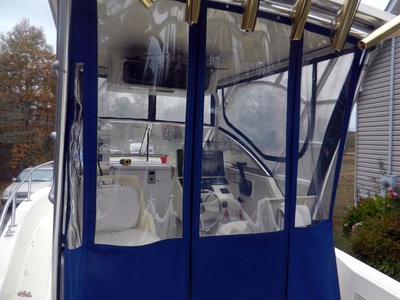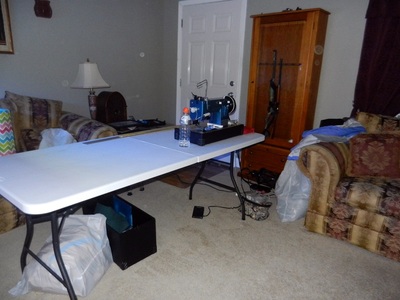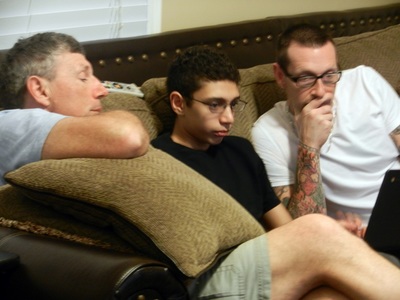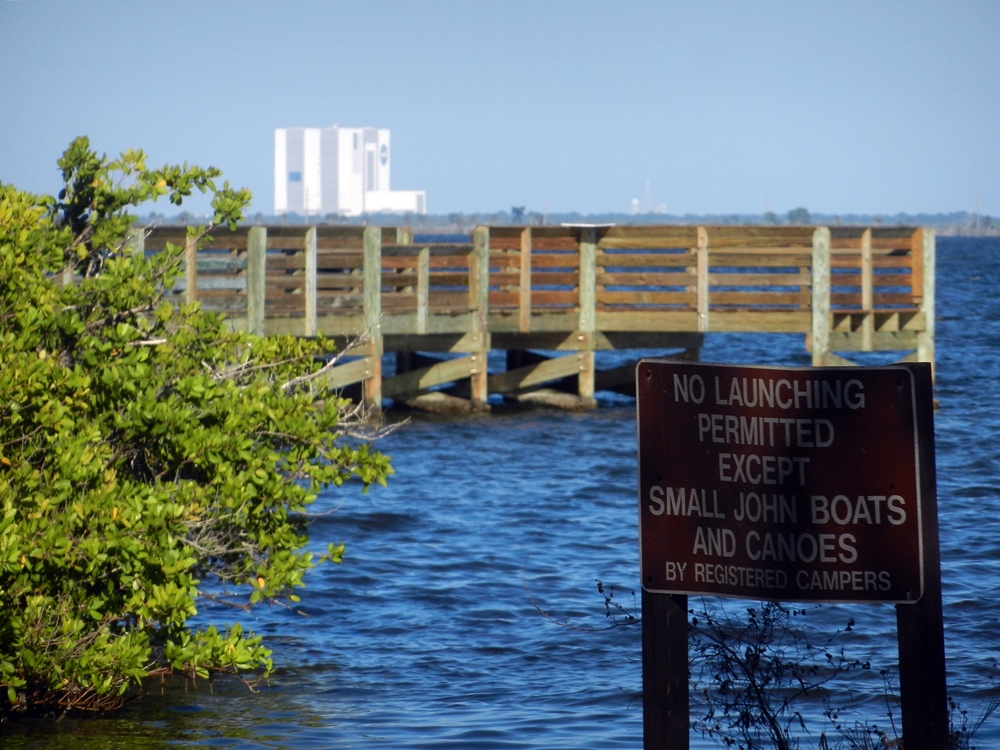 Kennedy Space Center's Vehicle Assembly Building from the campground
Kennedy Space Center's Vehicle Assembly Building from the campground As we worked our way south from Richmond, we had one more stop to make in Virginia, visiting our daughter’s family while Cathy did some work for our son-in-law’s boat. From there we made our way to Florida, shedding jeans and sweatshirts in favor of shorts and T-shirts. Along the way, we continued to learn about traveling by RV vs. sailboat.
As we worked our way south from Richmond, we had one more stop to make in Virginia, visiting our daughter’s family while Cathy did some work for our son-in-law’s boat. From there we made our way to Florida, shedding jeans and sweatshirts in favor of shorts and T-shirts. Along the way, we continued to learn about traveling by RV vs. sailboat.
As we worked our way south from Richmond, we had one more stop to make in Virginia, visiting our daughter’s family while Cathy did some work for our son-in-law’s boat. From there we made our way to Florida, shedding jeans and sweatshirts in favor of shorts and T-shirts. Along the way, we continued to learn about traveling by RV vs. sailboat.
 Parked in our daughter's driveway
Parked in our daughter's driveway Staying Off the Grid
It is one of the ironies of traveling with our fifth wheel that, so far, when we are closest to “civilization”, we have the least access to services (water, electric, sewer) than we do when we are in a campground, enjoying nature. After we left the Pocahantas State Park, we parked for a few days by our daughter’s driveway. When we left, we wouldn’t be back on the grid until we got to Florida. For the first time, we were spending several days “off the grid”, relying on the battery for power, the propane for refrigeration, heat and hot water, our water tanks for fresh water, and managing what went into the holding tanks, since we would be several days away from the next dump station.
It took little time to realize we have some work to do to allow us to spend extended time on the RV’s battery. With no 12V outlets, we couldn’t even charge our cell phones. We were inspired to rummage around on Orion Jr to pull out a spare outlet that Dave could wire in quickly and provide some temporary capabilities. That gave us a little relief. However, without Jr’s solar panels, the only way we could charge the batteries was to run the generator. The first time we fired up the Honda 1000,, it was immediately overloaded. We reviewed the circuit breakers for ways to reduce the load. After turning off the Microwave (easy call), the hot water heater, the Refrigerator (since it was running on propane) and the A/C (another no-brainer), the generator ran without a strain. However, we expected to have the AC outlets powered for the time the generator was running. Not exactly. It turned out that all but the ground fault outlets were connected to the breaker that controlled the hot water heater. We couldn’t turn that breaker on or we would certainly overload the generator. So, we seem to be restricted to the GFCI outlets. Another hole in our off-the-grid electrical system was the lack of a battery monitor. Without it, the only way to know how well the batteries were doing was to connect the multimeter to the newly installed 12V outlet. We now knew we had several improvement opportunities before our power systems would be ready for the extended trip we planned to Alaska next year.
On a more positive note, our fresh water supply was no issue. However, unlike the boat, the sink and shower drains did not go “overboard”, but are collected in the “grey” water tank. This meant that we were more concerned with conserving fresh water due to the holding tank issues, not because we might run out. The other holding tank, euphemistically called the “black” water tank was not an issue. We had lots more capacity than either boat, and the same strategies applied to this land yacht. Since we were staying at Wal-marts as we made our way south, and since we still hadn’t determined where we were stopping for an extended stay in Florida, we were going to have to find a place to dump the holding tanks to give us some more capacity “just in case”. We learned that Camping World had a dump station and there was one just off the interstate before our planned stop in Savannah. To take the best advantage of this, we pulled into the GA welcome center and parked the RV. We heated up the hot water and took showers that would go down the drain at the next exit. It worked pretty well.
As for the propane,since the temperature was warm enough to leave the heat off, and since we were taking most of our showers in the house when at our daughter’s, our primary use of the propane was the fridge. We felt we had a lot of capacity in our 2-30 lb tanks, but we didn’t know how to tell when we might be running low. We didn’t want to run the risk of losing the food in the fridge because we ran out of propane and didn’t know it.
So, we have plans for improvements to take care of some of the things we’ve learned. And we’re still learning what our capacities mean for us in real terms of staying off the grid.
It is one of the ironies of traveling with our fifth wheel that, so far, when we are closest to “civilization”, we have the least access to services (water, electric, sewer) than we do when we are in a campground, enjoying nature. After we left the Pocahantas State Park, we parked for a few days by our daughter’s driveway. When we left, we wouldn’t be back on the grid until we got to Florida. For the first time, we were spending several days “off the grid”, relying on the battery for power, the propane for refrigeration, heat and hot water, our water tanks for fresh water, and managing what went into the holding tanks, since we would be several days away from the next dump station.
It took little time to realize we have some work to do to allow us to spend extended time on the RV’s battery. With no 12V outlets, we couldn’t even charge our cell phones. We were inspired to rummage around on Orion Jr to pull out a spare outlet that Dave could wire in quickly and provide some temporary capabilities. That gave us a little relief. However, without Jr’s solar panels, the only way we could charge the batteries was to run the generator. The first time we fired up the Honda 1000,, it was immediately overloaded. We reviewed the circuit breakers for ways to reduce the load. After turning off the Microwave (easy call), the hot water heater, the Refrigerator (since it was running on propane) and the A/C (another no-brainer), the generator ran without a strain. However, we expected to have the AC outlets powered for the time the generator was running. Not exactly. It turned out that all but the ground fault outlets were connected to the breaker that controlled the hot water heater. We couldn’t turn that breaker on or we would certainly overload the generator. So, we seem to be restricted to the GFCI outlets. Another hole in our off-the-grid electrical system was the lack of a battery monitor. Without it, the only way to know how well the batteries were doing was to connect the multimeter to the newly installed 12V outlet. We now knew we had several improvement opportunities before our power systems would be ready for the extended trip we planned to Alaska next year.
On a more positive note, our fresh water supply was no issue. However, unlike the boat, the sink and shower drains did not go “overboard”, but are collected in the “grey” water tank. This meant that we were more concerned with conserving fresh water due to the holding tank issues, not because we might run out. The other holding tank, euphemistically called the “black” water tank was not an issue. We had lots more capacity than either boat, and the same strategies applied to this land yacht. Since we were staying at Wal-marts as we made our way south, and since we still hadn’t determined where we were stopping for an extended stay in Florida, we were going to have to find a place to dump the holding tanks to give us some more capacity “just in case”. We learned that Camping World had a dump station and there was one just off the interstate before our planned stop in Savannah. To take the best advantage of this, we pulled into the GA welcome center and parked the RV. We heated up the hot water and took showers that would go down the drain at the next exit. It worked pretty well.
As for the propane,since the temperature was warm enough to leave the heat off, and since we were taking most of our showers in the house when at our daughter’s, our primary use of the propane was the fridge. We felt we had a lot of capacity in our 2-30 lb tanks, but we didn’t know how to tell when we might be running low. We didn’t want to run the risk of losing the food in the fridge because we ran out of propane and didn’t know it.
So, we have plans for improvements to take care of some of the things we’ve learned. And we’re still learning what our capacities mean for us in real terms of staying off the grid.
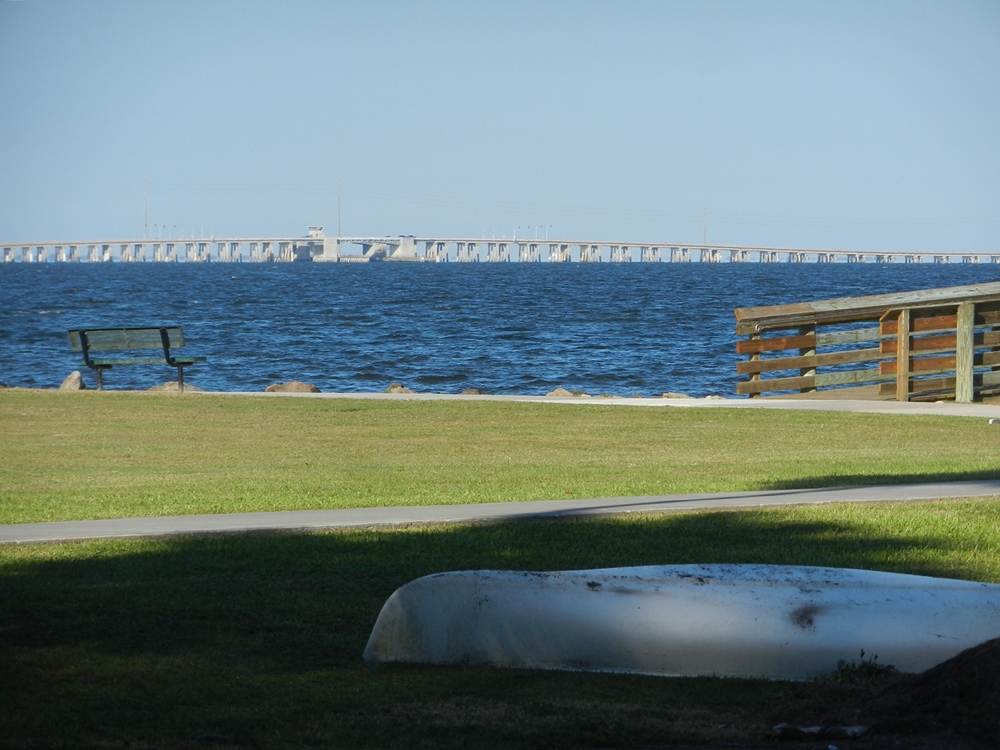 Addison Point Bridge from Manatee Hammock Campground
Addison Point Bridge from Manatee Hammock Campground Back on the Grid
As we crossed the line into Florida from Georgia, we were still no closer to knowing where we were going to spend the night. So, we took a cup of juice and all the camping brochures we could find and sat at a picnic table to begin finding a destination for the night or, hopefully, the week. Two hours later, we had contacted several dozen campgrounds. We finally decided on a county park in Titusville, called Manatee Hammock Park. It is directly opposite the Kennedy Space Center and just south of what boaters call the Addison Point Bridge. With Marianna, we had anchored just north of the bridge for almost a week one year waiting for a launch that never happened. It was an interesting perspective to watch the ICW from shore.
The campground was very pleasant and once there we were flush with services: water, electric, sewer, showers, wifi and even several dozen TV stations. What a difference a day makes. We settled in for about a week, spending time on a few projects that had been deferred by our visits and travel. To our dismay, our little CharBroil grill was in a sad state when Dave fired it up for the first time back in Virginia. So, we took advantage of an end-of-season sale to get a much nicer one. At Manatee Hammock, Dave was able to assemble and use it for the first time. It did a great job. Cathy made a bag for some of the parts so that, when disassembled for travel, they wouldn’t bounce around and get damaged.
As we crossed the line into Florida from Georgia, we were still no closer to knowing where we were going to spend the night. So, we took a cup of juice and all the camping brochures we could find and sat at a picnic table to begin finding a destination for the night or, hopefully, the week. Two hours later, we had contacted several dozen campgrounds. We finally decided on a county park in Titusville, called Manatee Hammock Park. It is directly opposite the Kennedy Space Center and just south of what boaters call the Addison Point Bridge. With Marianna, we had anchored just north of the bridge for almost a week one year waiting for a launch that never happened. It was an interesting perspective to watch the ICW from shore.
The campground was very pleasant and once there we were flush with services: water, electric, sewer, showers, wifi and even several dozen TV stations. What a difference a day makes. We settled in for about a week, spending time on a few projects that had been deferred by our visits and travel. To our dismay, our little CharBroil grill was in a sad state when Dave fired it up for the first time back in Virginia. So, we took advantage of an end-of-season sale to get a much nicer one. At Manatee Hammock, Dave was able to assemble and use it for the first time. It did a great job. Cathy made a bag for some of the parts so that, when disassembled for travel, they wouldn’t bounce around and get damaged.
 Cousins
Cousins Family and Friends
The few days spent at Bonnie and Troy’s house were very busy. We spent 4 ½ days building a rear enclosure for Troy’s boat. By the weekend, we had some time to entertain Troy and Taylor as overnight guests in the RV for a couple of nights. They had a great time, and we were getting pretty good at playing Old Maid. We enjoyed a campfire night in their backyard on Friday night and a get-together with Adam’s family on Saturday. In between the sewing and socializing, we gave Jr a small amount of attention, plugging in to give the batteries a better charge and checking for leaks. For the most part, she looked good, but she needs a SERIOUS cleaning.
By Monday, we were headed out, trying to stay ahead of the more intense rain. However, it caught up with us as we were nearing our destination of a Wal-mart in Leland south of Wilmington, NC. We were there to visit with George and Gail, and managed to spend the afternoon and evening visiting with them in their lovely home nearby. After a delicious meal, the ladies scored a hard-won victory over the men in a game of Marbles and Jokers. A perfect end to the day.
The few days spent at Bonnie and Troy’s house were very busy. We spent 4 ½ days building a rear enclosure for Troy’s boat. By the weekend, we had some time to entertain Troy and Taylor as overnight guests in the RV for a couple of nights. They had a great time, and we were getting pretty good at playing Old Maid. We enjoyed a campfire night in their backyard on Friday night and a get-together with Adam’s family on Saturday. In between the sewing and socializing, we gave Jr a small amount of attention, plugging in to give the batteries a better charge and checking for leaks. For the most part, she looked good, but she needs a SERIOUS cleaning.
By Monday, we were headed out, trying to stay ahead of the more intense rain. However, it caught up with us as we were nearing our destination of a Wal-mart in Leland south of Wilmington, NC. We were there to visit with George and Gail, and managed to spend the afternoon and evening visiting with them in their lovely home nearby. After a delicious meal, the ladies scored a hard-won victory over the men in a game of Marbles and Jokers. A perfect end to the day.
